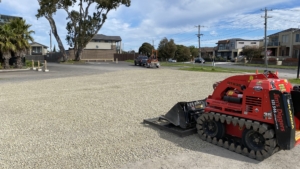Repairing Potholes in Gravel Driveways and Carparks
Gravel driveways and carparks are a popular choice for homeowners, rural properties, and businesses. They offer a natural look, are relatively affordable compared to concrete or asphalt, and can handle heavy traffic when properly maintained. However, one common issue that arises over time is the formation of potholes.
Potholes can quickly turn a smooth, functional surface into a problematic area filled with dips, water pooling, and uneven patches that not only look unattractive but can also cause damage to vehicles and create safety hazards. Understanding why potholes form, how to fix them, and why hiring a professional digger service is the best option can save you time, money, and a lot of frustration.
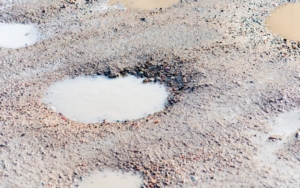
Why Do Potholes Form in Gravel Driveways and Carparks?
While gravel surfaces are durable and flexible, they are not immune to wear and tear. Potholes are caused by a combination of factors, and once they start, they can expand quickly if not addressed.
1. Weather Conditions
Rain is one of the biggest culprits when it comes to pothole formation. Water infiltrates the surface of the gravel and begins to wash away the finer particles beneath. During heavy rainfall, the flow of water can erode the sub-base, creating pockets and depressions. When these low areas are repeatedly driven over, they compress further and form potholes.
Cold weather can make matters worse. Water trapped under the gravel may freeze and expand, creating cracks and voids. When it thaws, the gravel shifts, leaving uneven surfaces that lead to larger potholes.
2. Heavy Vehicles and Frequent Traffic
Gravel driveways and carparks that see frequent use by heavy vehicles such as trucks, caravans, or farm machinery tend to develop potholes faster. The weight of these vehicles compacts some areas while loosening others, especially if the surface is not regularly graded or maintained.
3. Poor Drainage
Water pooling on a gravel driveway or carpark is often a sign of poor drainage. Without a proper slope or crown (a slightly raised center), water can collect and soften the base layers of gravel. Over time, this weakens the surface, causing gravel displacement and potholes.
4. Lack of Maintenance
Gravel surfaces require periodic maintenance, such as grading, replenishing gravel, and compacting. If these tasks are neglected, the surface becomes uneven and susceptible to damage. Small depressions can quickly turn into potholes when left untreated.
The Problems with Ignoring Potholes
Some people dismiss potholes as minor inconveniences, but leaving them unattended can lead to significant issues over time.
Uneven Surfaces: A driveway with multiple potholes can make driving difficult and uncomfortable. Vehicles may jolt and bump, creating unnecessary wear on tires and suspension systems.
Water Pooling: Potholes often collect water, which further weakens the structure of the driveway. Standing water also attracts mud and debris, making the area messy and slippery.
Vehicle Damage: Sharp edges and deep holes can damage tires, rims, and undercarriages of vehicles. This can result in costly repairs, particularly if the driveway or carpark is used frequently.
Increased Repair Costs: A small pothole might be simple to repair, but if ignored, it will expand and lead to more extensive damage. Fixing multiple large potholes or resurfacing an entire driveway can be much more expensive.
Aesthetic Issues: A driveway filled with potholes looks neglected and uninviting, reducing the overall curb appeal of your property.
DIY Pothole Repairs – Are They Worth It?
Some property owners try to repair potholes themselves, often using basic tools like shovels, rakes, or a wheelbarrow. While it’s possible to fill small holes with extra gravel, DIY methods rarely last.
The problem with DIY pothole fixes is that they usually don’t address the root cause. Most people simply dump gravel into the hole and smooth it over, but without proper leveling, compaction, and base preparation, the patch will quickly deteriorate. Rain and traffic will displace the loose gravel, and within weeks, the pothole will reappear—often larger than before.
Common issues with DIY repairs:
- Lack of proper equipment for grading or compacting.
- Inability to create a solid, stable base.
- Incorrect drainage or slope adjustment.
- More time and physical effort compared to professional services.
If you value your time and want a long-lasting result, hiring a professional is a far better investment.
Why Hire a Professional Digger Service?
A professional digger service, like Jim’s Diggers, has the experience, equipment, and techniques to ensure your pothole repairs are done right the first time. Here’s why it makes sense:
1. Efficient and Quick Repairs: Mini diggers and excavation equipment make the process fast and effective. Rather than spending hours (or days) digging, leveling, and compacting by hand, a skilled operator can handle the job in a fraction of the time.
2. Proper Surface Preparation: The key to a long-lasting pothole repair is in the preparation. Professionals don’t just fill the hole—they remove loose material, re-grade the area, and ensure a solid base layer before adding fresh gravel.
3. Expert Knowledge of Gravel and Compaction: Not all gravel is the same. A digger service knows which type of gravel is best for your driveway or carpark, and how to compact it properly for maximum durability.
4. Cost-Effective in the Long Run: While hiring professionals has an upfront cost, it prevents repeat repairs. A proper fix means you won’t be filling the same hole every few months, which saves money over time.
5. Professional Finish: A driveway or carpark repaired by professionals doesn’t just function better—it looks better too. A smooth, evenly compacted surface improves both safety and appearance.
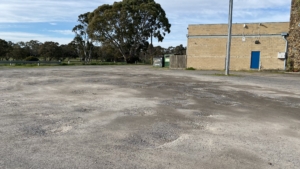
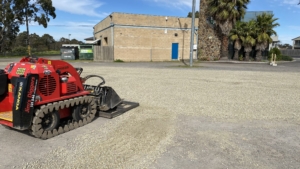
How the Pothole Repair Process Works
When you hire a service like Jim’s Diggers, here’s what you can expect during a pothole repair:
1. Assessment of Damage: The first step is to inspect the driveway or carpark to identify the extent of the damage. The team will look for potholes, drainage issues, and uneven surfaces that may need attention.
2. Excavation and Removal of Loose Material: The damaged area is excavated to remove any loose gravel, dirt, or debris. This ensures that the new gravel will sit on a firm, stable base.
3. Leveling and Compaction of Base: Using a mini digger, the surface is leveled, and a compacted base is created. Proper compaction is essential to prevent future sinking or shifting.
4. Addition of Fresh Gravel: High-quality gravel is added to the repaired section, ensuring the size and type of stone match the existing surface.
5. Final Grading and Compaction: The area is graded for proper drainage and compacted again to create a smooth, even finish that blends seamlessly with the rest of the driveway.
Benefits of Hiring Jim’s Diggers
Jim’s Diggers is a trusted name in excavation and earthmoving services across Australia. With a team of experienced operators and modern equipment, we handle jobs of all sizes—whether you have a few small potholes or need a full driveway restoration.
What sets Jim’s Diggers apart:
- Skilled and friendly operators who understand local conditions.
- Affordable, transparent pricing with no hidden fees.
- Reliable service and fast turnaround times.
- Expertise in excavation, leveling, and gravel replacement.
- Part of the trusted Jim’s Group, known for high-quality services nationwide.
Preventing Future Potholes
Once your driveway or carpark has been repaired, ongoing maintenance is essential to prevent potholes from coming back. Here are a few tips:
- Regular Grading: A light grading every 6–12 months helps keep the surface even and prevents low spots where water can pool.
- Add Fresh Gravel When Needed: Over time, gravel gets compacted or washed away. Topping up with fresh gravel helps maintain the right thickness and stability.
- Ensure Proper Drainage: Make sure your driveway or carpark has a slight slope or crown to allow water to run off.
- Address Small Holes Quickly: Fixing small depressions early can stop them from developing into full potholes.
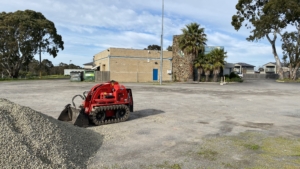
Conclusion
Potholes in gravel driveways and carparks are an inevitable part of wear and tear, but they don’t have to be a long-term problem. While DIY fixes might seem appealing, they rarely last and often end up costing more time and effort. Hiring a professional digger service like Jim’s Diggers ensures that your driveway is repaired correctly, efficiently, and with long-lasting results.
With the right equipment and expertise, we can restore your gravel surface to its original condition, improving both functionality and appearance. Whether you have a residential driveway or a commercial carpark, our team can handle the job with precision and care.
Need help repairing potholes in your gravel driveway?
Contact Jim’s Diggers today for reliable and affordable excavation services. We’ll get your surface looking smooth and performing at its best—so you can enjoy a hassle-free driveway for years to come.
